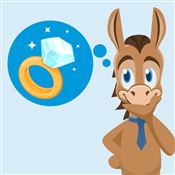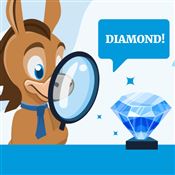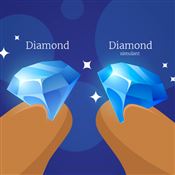Survey: Diamond Engagement Rings
CreditDonkey surveyed over 1,000 Americans to find out their thoughts about diamond engagement rings. The results are surprising.
 |
| © CreditDonkey |
How Much Should an Engagement Ring Cost?
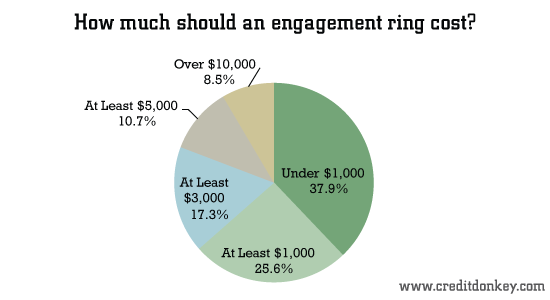 |
| How much should an engagement ring cost? © CreditDonkey |
We've all heard of the "two months' salary" guideline. But our survey finds that most people's cost expectations for an engagement ring are not so high. Here's what people really think:
- Over 1 in 3 respondents (36% women and 38% men) think the engagement ring should cost less than $1,000.
- 26% of respondents think the ring should cost at least $1,000.
- 17.3% of respondents think it should cost at least $3,000.
- Only about 1 in 5 people (19%) think it should cost over $5,000.
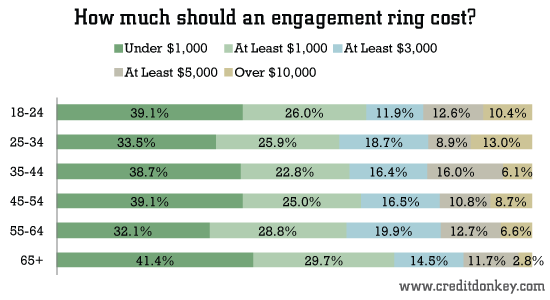 |
| How much should an engagement ring cost? © CreditDonkey |
Breaking it further into age groups, Millennials seem to think the ring should cost more compared to other age groups. 13% of Millennials (ages 25 to 34 - the most common ages to become engaged) think the ring should cost at least $10,000, while only 6% of respondents aged 35-44 felt the same.
Are men overpaying for engagement rings? Most women don't expect an expensive engagement ring, according to results from our survey.
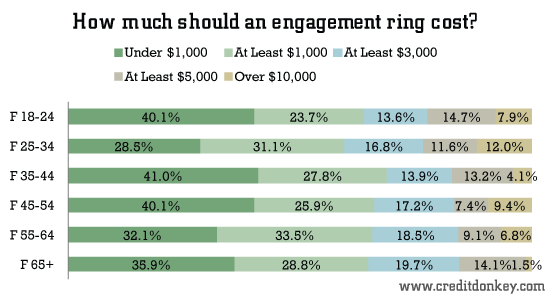 |
| Female Opinions: How much should an engagement ring cost? © CreditDonkey |
In all age groups, 3 in 5 women don't expect a ring over $3,000. But again, Millennials have the highest cost expectations. Only 28.5% of girls aged 25-34 answered "less than $1,000," while that goes up to 41% for women aged 35-44. 12% of Millennial women answered "at least $10,000," compared to just 4% of women aged 35-44.
Man-Made Diamonds Gaining Popularity
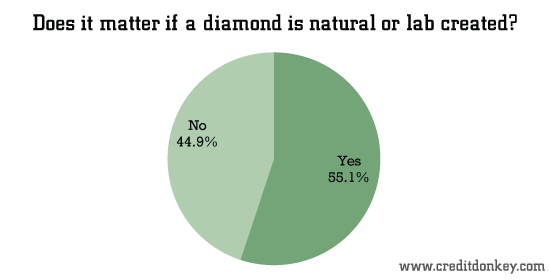 |
| Does it matter if a diamond is natural or lab created? © CreditDonkey |
Part of a diamond's appeal is that it's a natural gemstone that was formed millions of years ago in the Earth's crust. What about synthetic diamonds, which can be made in a lab in just weeks?
Almost half the people (45%) don't mind a lab-created diamond.
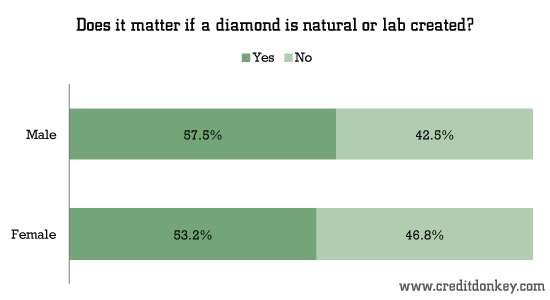 |
| Does it matter if a diamond is natural or lab created? © CreditDonkey |
Men seem to place more importance on getting the real thing. 58% of men thinks it matters, compared to 53% of women.
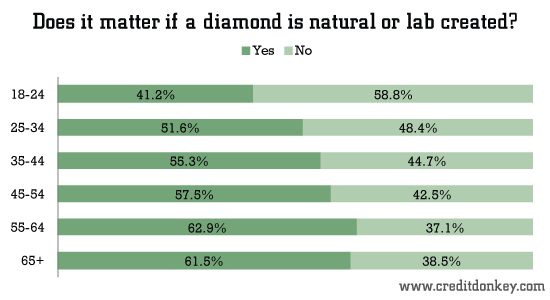 |
| Does it matter if a diamond is natural or lab created? © CreditDonkey |
Younger people are more receptive to lab-created diamonds. 59% of respondents aged 18-24 are fine with a man-made diamond. But this figure significantly decreases to 37% of those aged 55-64.
Perhaps this means that the younger generation are more conscious of social issues associated with diamond mining. "Blood diamonds are a bad start to a lifetime of love," said one respondent.
Is it OK to have a Fake Engagement Ring?
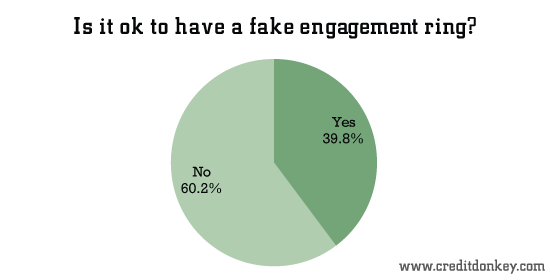 |
| Is it ok to have a fake engagement ring? © CreditDonkey |
A truly surprising finding is that 2 in 5 people (40%) think a fake ring is acceptable. Even more astonishing - women are more okay with a fake ring than men. 44% of women don't mind a fake ring, compared to only 35% of men.
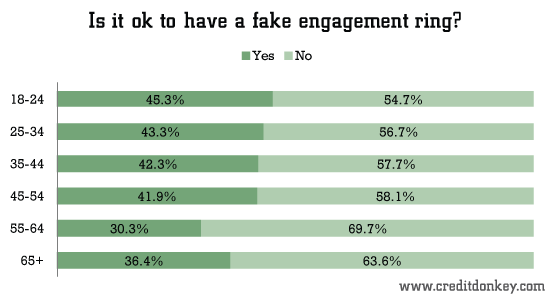 |
| Is it ok to have a fake engagement ring? © CreditDonkey |
Younger people are more okay with a fake engagement ring. 45% of 18- to 24-year-olds and 43% of 25- to 34- year-olds don't mind a fake ring. This goes down to the just 30% in the 50-64 age group.
Is a Diamond Ring a Good Investment: Women Say Yes, Men Say No
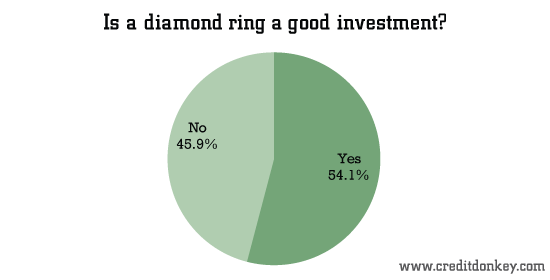 |
| Is a diamond ring a good investment? © CreditDonkey |
More women believe a diamond ring to be a good investment (61% vs. 43% of men). "Insurance," one respondent answered, "I can sell it if things go wrong with the marriage." In fact, diamonds are incredibly hard to sell back. Most people will never even get close to what they paid in price.
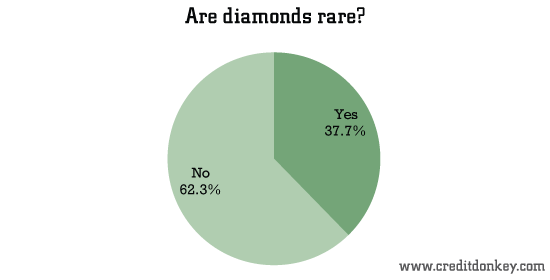 |
| Are diamonds rare? © CreditDonkey |
But ironically, most people seem to know diamonds are not rare. Only 38% of people believe diamonds are rare. Even among those who think diamonds are good investments, 50% answered that they're not rare.
The truth is that diamonds are not rare; it's just that the diamond supply is controlled. "Diamonds are market manipulated," one male respondent explained when answering why an engagement ring is not necessary.
Almost Half Think Engagement Rings Are No Longer Necessary
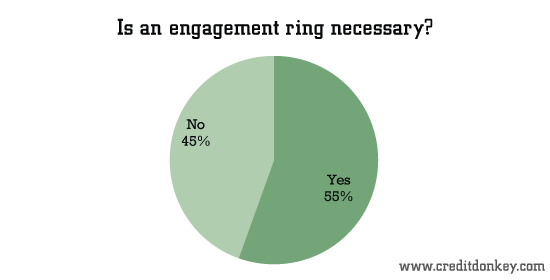 |
| Is an engagement ring necessary? © CreditDonkey |
Surprisingly, women beat out men in response to that an engagement ring is not necessary. Almost half of women (45%) said it's not necessary, compared to 41% of men.
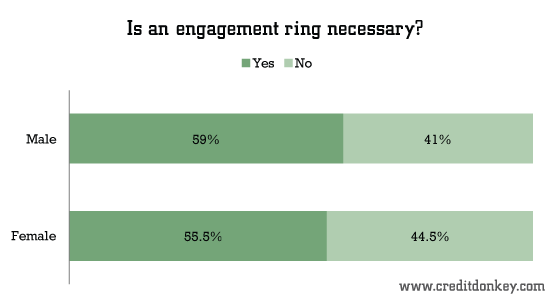 |
| Is an engagement ring necessary? © CreditDonkey |
Younger people are more likely to think an engagement ring is necessary. Though, this is also the age group most okay with fake rings. 64% of 18- to 24-year-olds and 63% of 25- to 34-year-olds think it's still important to have an engagement ring. This drops down to 52% when you get to ages 65 and over.
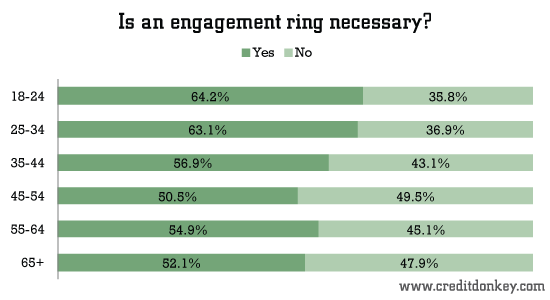 |
| Is an engagement ring necessary? © CreditDonkey |
This finding suggests that the older people get, the less emphasis they put on material things. Perhaps more mature people feel more secure in their relationships and need less material proof.
Many respondents felt that you don't need to prove love with an engagement ring. "The integrity of the commitment is what's important," one male respondent said. A female respondent felt the same by answering, "Trust, respect and honesty are most important, not materialistic things." A phrase seen over and over was "love is more important." A lot of people also felt that a wedding band is more symbolic of love.
Another common theme heard was that building a future together is more important. "Money better spent for a home," one female respondent said. Another echoed the feeling with "It's more important to have money throughout the marriage than to have a ring."
On the other hand, proponents of the engagement ring felt like it's still necessary to show commitment. "It is an official statement that you are serious in a future commitment," one female respondent said. "Tradition" is a word cited over and over. "The idea and process of getting married needs to keep its meaning and steps to keep it important," said one respondent.
Millennials Value Honeymoon Over the Engagement Ring
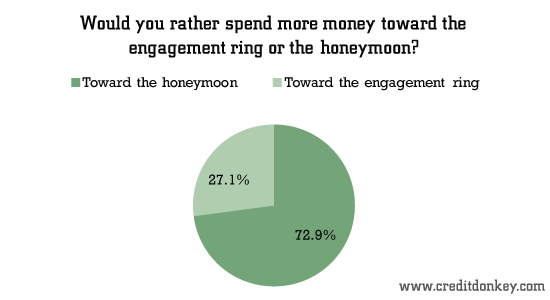 |
| © CreditDonkey |
When asked if they would rather spend more money towards the engagement ring or honeymoon, almost 3 in 4 people chose honeymoon. 71% of women and 75% men answered that they'd rather have a nicer honeymoon.
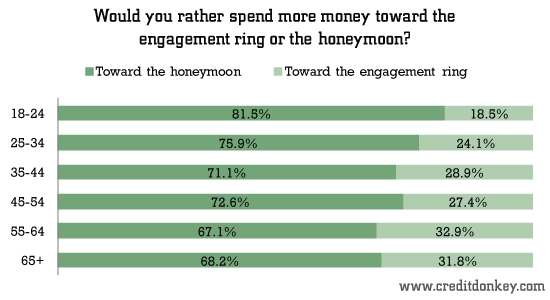 |
| © CreditDonkey |
Younger people are more likely to want a nicer honeymoon over a ring, with 82% of respondents aged 18-24 and 76% of Millennials aged 25-34 choosing the honeymoon. This figure jumps down to 67% among 55- to 64-year-olds.
It seems that most couples would rather use the money on something they can both enjoy together. This also might suggest that the younger generations value experiences more than materials things.
Does Size Matter? Men Says Size, Women Says Quality
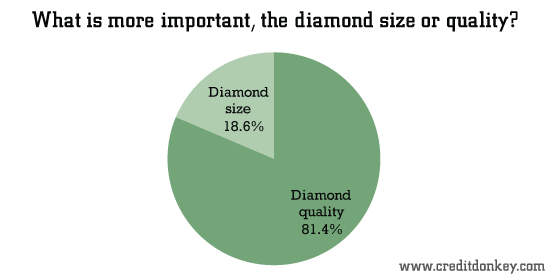 |
| What is more important, the diamond size or quality? © CreditDonkey |
Once and for all, we find the answer to the all-important question: does size matter?
An overwhelming 81% of respondents answered that quality is more important than size.
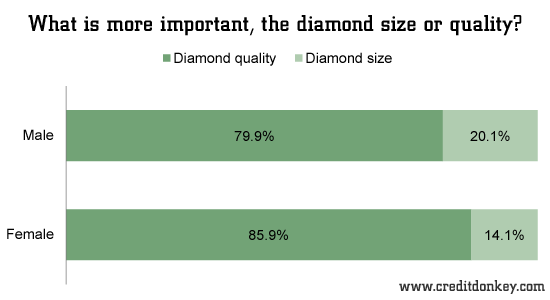 |
| What is more important, the diamond size or quality? © CreditDonkey |
It's often assumed by society that women want large diamonds, but our survey finds that men are actually more likely to place importance on size. 20% of men think size is more important, compared to just 14% of women.
Most Want the Engagement Ring to be a Surprise
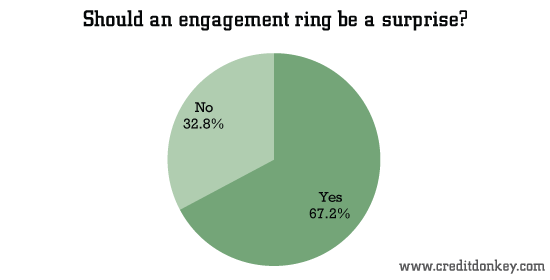 |
| Should an engagement ring be a surprise? © CreditDonkey |
One thing though, is that most people still like the idea and romance of a surprise proposal. About 2/3 of people (66% men and 69% women) think it should be a surprise. Younger people are more likely to want a surprise. 76.5% of Millennials want to be surprised, compared to 52.2% of those aged 55-64.
Given the huge discrepancy between what Americans actually spend on the ring and what they think it should cost, the surprise factor may play a big part. This might indicate that couples are not discussing their expectations beforehand. This may lead men to overspend.
Bottom Line
Our survey results suggest that people have more of an open mind towards engagement rings. The 1940's De Beers ad may have convinced everyone into thinking a diamond ring is the ultimate symbol of love, but many people are more practical now. More and more people are valuing a better future and experiences over a diamond ring.
If an engagement is in your future, make sure you first discuss your expectations and wishes for the future with your partner. You may be surprised to find out that a ring isn't at the top of her list.
Survey Methodology
CreditDonkey conducted the online survey of 1,064 Americans, age 18 and over, between April 2, 2018 and April 4, 2018. The survey was conducted using Google Surveys. Survey results are representative of the U.S. internet population.
|
|
|


